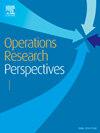异构多车场车辆路由问题的分散消息传递算法
IF 3.7
4区 管理学
Q2 OPERATIONS RESEARCH & MANAGEMENT SCIENCE
引用次数: 0
摘要
本文提出了一种基于信念传播的消息传递算法AMP-R,以分布式方式解决异构多车场车辆路由问题。与传统方法不同,这是第一次尝试在仓库级别分散HMDVRP的解决方案过程,使每个仓库能够独立计算和交换消息,以获得无冲突的解决方案。HMDVRP要求将客户分配到仓库,并确定使总旅行成本最小化的路线。通过将问题重新表述为包含仓库和客户节点的图形模型中的最大后验估计,所提出的方法实现了仓库之间的分散消息计算和交换,有效地解决了各种类型的HMDVRP。在此过程中,推导出每个消息计算可以简化为子集访问旅行商问题或有能力的车辆路由问题,并提出了近似技术来解决这些计算挑战。此外,为了保证解决方案的收敛性和可行性,还引入了消息缓冲区和改进过程。大量的仿真表明,所提出的AMP-R算法产生了具有计算效率的近最优解,为寻找最优解具有挑战性的复杂大规模实例提供了实用性能。本文章由计算机程序翻译,如有差异,请以英文原文为准。
Decentralized message passing algorithm for heterogeneous multi-depot vehicle routing problems
In this paper, a novel message-passing algorithm, named AMP-R, based on belief propagation is proposed to solve the heterogeneous multi-depot vehicle routing problem (HMDVRP) in a distributed manner. Unlike traditional approaches, this is the first attempt to decentralize the solution process for the HMDVRP at the depot level, enabling each depot to independently compute and exchange messages to derive conflict-free solutions. The HMDVRP requires assigning customers to depots and determining routes that minimize total travel cost. By reformulating the problem as a maximum a posteriori estimation in a graphical model comprising depot and customer nodes, The proposed approach enables decentralized message calculation and exchange between depots, effectively addressing various types of the HMDVRP. In this process, it is derived that each message calculation can be reduced to a subset-visit traveling salesman problem or a capacitated vehicle routing problem, and approximation techniques are proposed to address these computational challenges. Furthermore, to ensure solution convergence and feasibility, message buffers and a refinement process are introduced. Extensive simulations demonstrate that the proposed AMP-R algorithm yields near-optimal solutions with computational efficiency, offering practical performance for complex large-scale instances where finding optimal solutions is challenging.
求助全文
通过发布文献求助,成功后即可免费获取论文全文。
去求助
来源期刊

Operations Research Perspectives
Mathematics-Statistics and Probability
CiteScore
6.40
自引率
0.00%
发文量
36
审稿时长
27 days
 求助内容:
求助内容: 应助结果提醒方式:
应助结果提醒方式:


